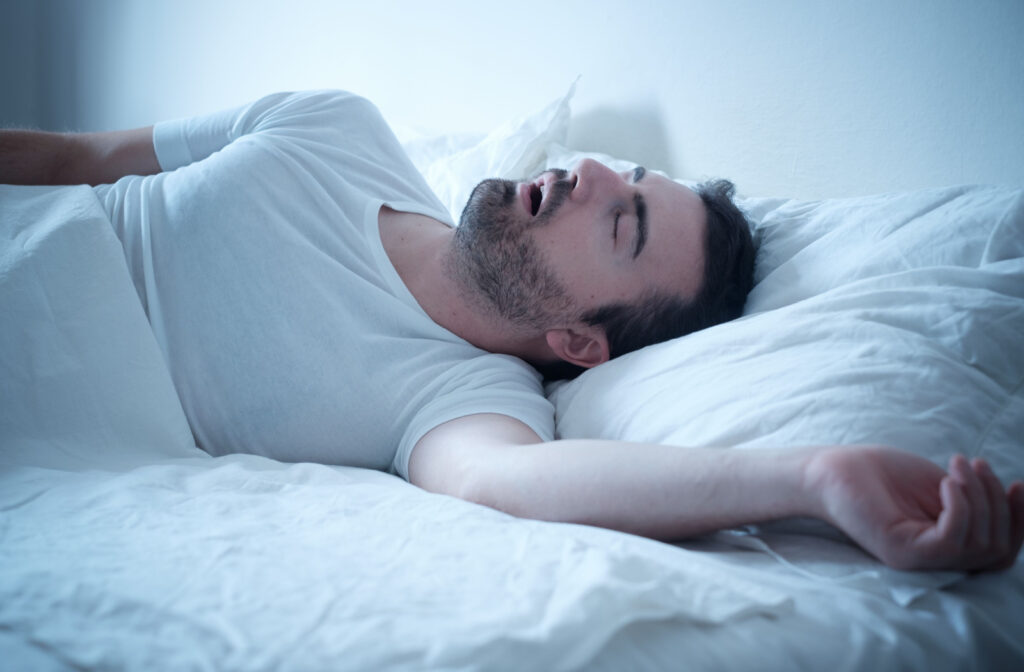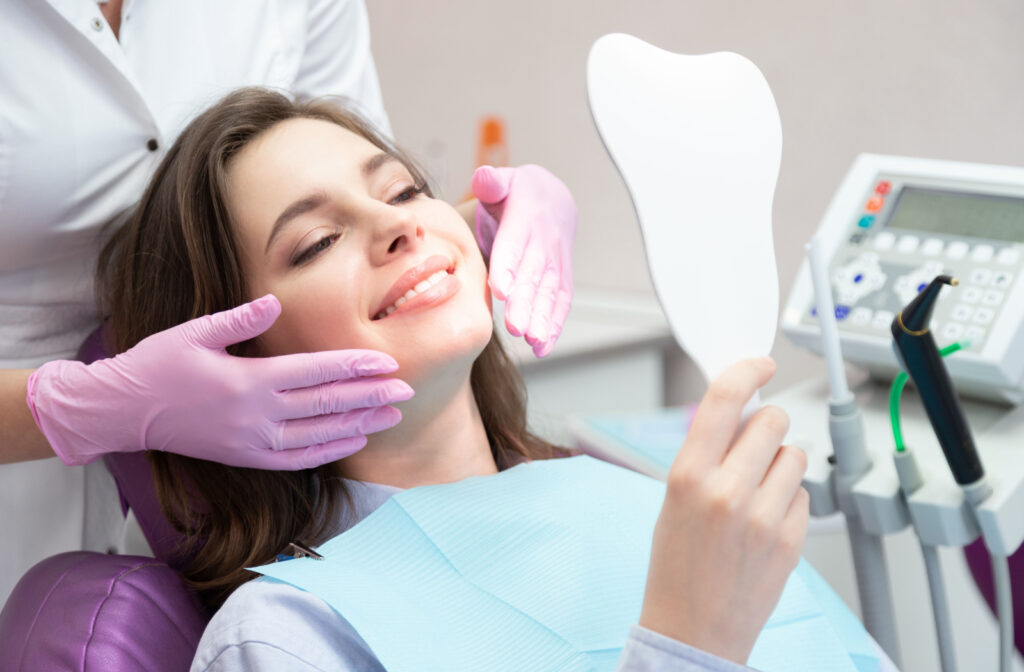Why Do People Snore?
4 out of 10 Canadians snore. Men are also more likely to snore than women, and the severity worsens with age.
When you sleep, your throat muscles loosen up, your tongue slips backward, and your throat narrows. Your throat vibrates when you breathe, and snoring is caused by these vibrations. Bigger vibrations equal louder snoring and narrower airways. Snoring is more prevalent in those who are overweight or carry extra weight in the neck area. Snoring may also be related to an individual’s jaw or nose structure.
Many people who snore also experience sleep apnea. Snoring due to sleep apnea can be a warning sign that should not be ignored, especially when accompanied by additional symptoms such as weariness, uneven breathing, irritability and erratic emotions, or morning headaches. It’s essential to see a doctor if you think you may have sleep apnea, as it can be harmful to your health.
Waking up to your significant other snoring is an all too common experience. While sending them off to sleep on the couch is one option, this doesn’t have to be your reality anymore with laser treatment for snoring!
An innovative technique in the growing field of dental sleep medicine, laser treatments are a straightforward option for individuals who snore. Laser treatments for snoring offer a noninvasive, efficient, and comfortable solution. With 15 minute laser treatments applied to the soft palate tissue, this treatment shrinks collagen to help tighten and open breathing channels. What’s more, the same laser used to help treat snoring has many other medical, cosmetic, and dental uses.
What Is Laser Treatment for Snoring?
Laser treatment for snoring is a laser that, while classified as ablative, is non-surgical. It tightens the soft palate tissue and opens breathing channels, helping individuals receive relief from snoring and irregular sleeping patterns. It is a reversible procedure that,
when applied to the inside of the mouth and throat, can result in temporary or long-term relief from snoring.
Solea Sleep Laser
The Solea Sleep laser is one of the laser options for treating snoring; it is a CO2 laser that operates at a unique wavelength to tighten the soft palate tissue and open breathing channels. Some laser treatments require many long sessions, but Solea Sleep can deliver long-term results in one or two sessions at only around 15 minutes each.
How Does Laser Treatment for Snoring Work?
The laser light focuses on the soft tissue in the back of the throat, and a warm sensation occurs. The laser energy is now working to tighten and tone the palate tissue. The result is reduced vibrations that produce snoring. There is no recovery period afterwards, and results vary depending on the individual.
How Often Do You Need to Repeat the Process?
Individual results vary, however, the treatment usually lasts 12 to 15 months. After that, patients may want to consider booking another visit. Results are not permanent as collagen in the tissue naturally relaxes over time.
Is Laser Treatment for Snoring Painful?
Applying a laser to the back of your throat to help treat snoring sounds like it would be painful, but it’s considered a comfortable procedure. Some individuals develop a slight sore throat after their treatment, but most don’t encounter any side effects.
A topical anesthetic spray on the tongue and soft palate tissue may be applied before the procedure as a preventative measure for any discomfort and potential gagging. Following treatment, patients may experience brief tissue irritability lasting about 24 hours.
What Are the Risks of Using a Laser to Treat Snoring?
There are virtually no risks to the individual for using laser treatment for snoring, however, some dental and medical professionals caution that laser treatment may mask the underlying health issues surrounding snoring, such as sleep apnea. Many people who snore also suffer from sleep apnea. Even with laser treatment significantly decreasing snoring, sleep apnea may still exist.
Snoring is the partial blockage of the airway, whereas sleep apnea is a full airway blockage for 10 seconds or longer. When patients receive laser treatment for snoring, the symptoms tend to fade away for some time, but this does not mean the underlying issue has been resolved. Diagnostic sleep studies are key in deciding whether treatments additional to laser treatment for snoring are needed for each individual.
What Are the Benefits of Laser Treatment for Snoring?
Laser treatment can offer an array of benefits for patients who struggle with snoring. Some of these include:
- Reduced or eliminated snoring
- Better, deeper sleep which may improve the immune system
- Elimination of headaches and sore throats in the morning
- Improved mood and more energy during the day
- Enhanced focus, memory, and learning capacity
- Lower impact of sleep apnea
- No longer disturbing your partner’s sleep
- Snoring relief without surgery
- Lower cost than a CPAP machine and a mandibular advancement guard
- More lifestyle appropriate

How to Book An Appointment
If you are someone who suffers from snoring, or the partner of someone who snores, and are interested in investing in yourself and your health, laser treatment for snoring could be an option for you. Reach out to our experienced False Creek Dental team today to schedule your appointment!



